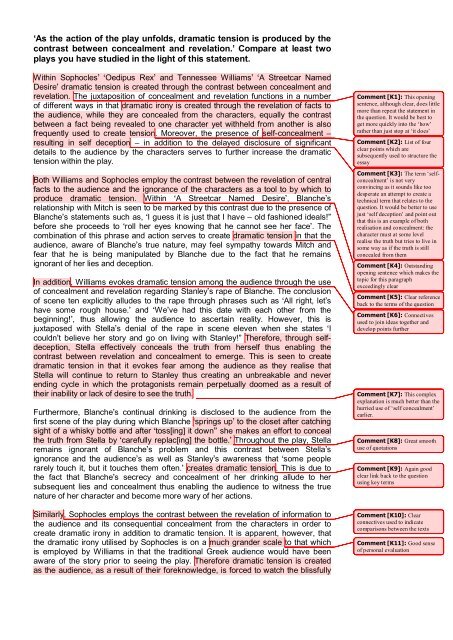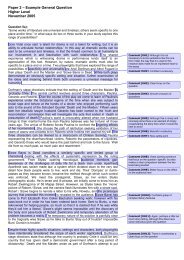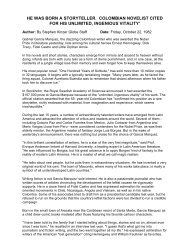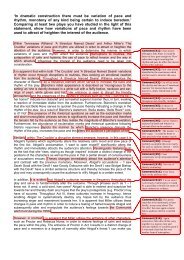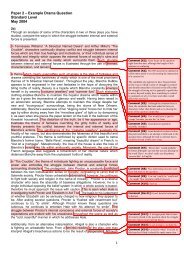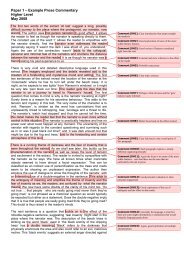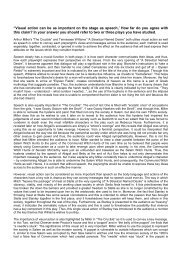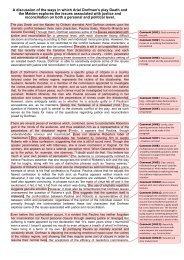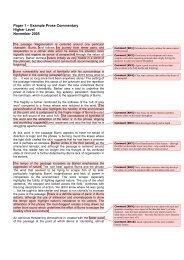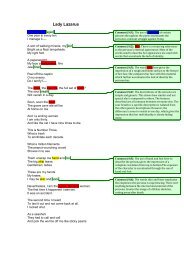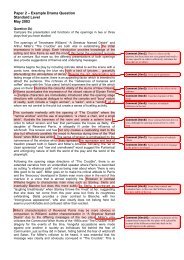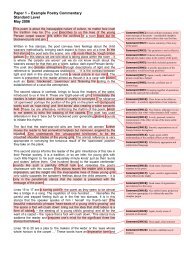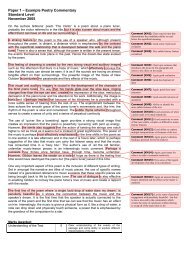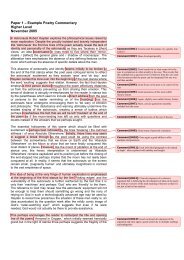Concealment & Revelation - Mr Hoye's IB English Website
Concealment & Revelation - Mr Hoye's IB English Website
Concealment & Revelation - Mr Hoye's IB English Website
You also want an ePaper? Increase the reach of your titles
YUMPU automatically turns print PDFs into web optimized ePapers that Google loves.
‘As the action of the play unfolds, dramatic tension is produced by the<br />
contrast between concealment and revelation.’ Compare at least two<br />
plays you have studied in the light of this statement.<br />
Within Sophocles Oedipus Rex and Tennessee Williams A Streetcar Named<br />
Desire dramatic tension is created through the contrast between concealment and<br />
revelation. The juxtaposition of concealment and revelation functions in a number<br />
of different ways in that dramatic irony is created through the revelation of facts to<br />
the audience, while they are concealed from the characters, equally the contrast<br />
between a fact being revealed to one character yet withheld from another is also<br />
frequently used to create tension. Moreover, the presence of self-concealment <br />
resulting in self deception in addition to the delayed disclosure of significant<br />
details to the audience by the characters serves to further increase the dramatic<br />
tension within the play.<br />
Both Williams and Sophocles employ the contrast between the revelation of central<br />
facts to the audience and the ignorance of the characters as a tool to by which to<br />
produce dramatic tension. Within A Streetcar Named Desire, Blanches<br />
relationship with Mitch is seen to be marked by this contrast due to the presence of<br />
Blanches statements such as, I guess it is just that I have old fashioned ideals!<br />
before she proceeds to roll her eyes knowing that he cannot see her face. The<br />
combination of this phrase and action serves to create dramatic tension in that the<br />
audience, aware of Blanches true nature, may feel sympathy towards Mitch and<br />
fear that he is being manipulated by Blanche due to the fact that he remains<br />
ignorant of her lies and deception.<br />
In addition, Williams evokes dramatic tension among the audience through the use<br />
of concealment and revelation regarding Stanleys rape of Blanche. The conclusion<br />
of scene ten explicitly alludes to the rape through phrases such as All right, lets<br />
have some rough house. and Weve had this date with each other from the<br />
beginning!, thus allowing the audience to ascertain reality. However, this is<br />
juxtaposed with Stellas denial of the rape in scene eleven when she states I<br />
couldnt believe her story and go on living with Stanley! Therefore, through selfdeception,<br />
Stella effectively conceals the truth from herself thus enabling the<br />
contrast between revelation and concealment to emerge. This is seen to create<br />
dramatic tension in that it evokes fear among the audience as they realise that<br />
Stella will continue to return to Stanley thus creating an unbreakable and never<br />
ending cycle in which the protagonists remain perpetually doomed as a result of<br />
their inability or lack of desire to see the truth.<br />
Furthermore, Blanches continual drinking is disclosed to the audience from the<br />
first scene of the play during which Blanche springs up to the closet after catching<br />
sight of a whisky bottle and after toss[ing] it down she makes an effort to conceal<br />
the truth from Stella by carefully replac[ing] the bottle. Throughout the play, Stella<br />
remains ignorant of Blanches problem and this contrast between Stellas<br />
ignorance and the audiences as well as Stanleys awareness that some people<br />
rarely touch it, but it touches them often. creates dramatic tension. This is due to<br />
the fact that Blanches secrecy and concealment of her drinking allude to her<br />
subsequent lies and concealment thus enabling the audience to witness the true<br />
nature of her character and become more wary of her actions.<br />
Similarly, Sophocles employs the contrast between the revelation of information to<br />
the audience and its consequential concealment from the characters in order to<br />
create dramatic irony in addition to dramatic tension. It is apparent, however, that<br />
the dramatic irony utilised by Sophocles is on a much grander scale to that which<br />
is employed by Williams in that the traditional Greek audience would have been<br />
aware of the story prior to seeing the play. Therefore dramatic tension is created<br />
as the audience, as a result of their foreknowledge, is forced to watch the blissfully<br />
Comment [K1]: This opening<br />
sentence, although clear, does little<br />
more than repeat the statement in<br />
the question. It would be best to<br />
get more quickly into the how<br />
rather than just stop at it does<br />
Comment [K2]: List of four<br />
clear points which are<br />
subsequently used to structure the<br />
essay<br />
Comment [K3]: The term selfconcealment<br />
is not very<br />
convincing as it sounds like too<br />
desperate an attempt to create a<br />
technical term that relates to the<br />
question. It would be better to use<br />
just self deception and point out<br />
that this is an example of both<br />
realisation and concealment: the<br />
character must at some level<br />
realise the truth but tries to live in<br />
some way as if the truth is still<br />
concealed from them<br />
Comment [K4]: Outstanding<br />
opening sentence which makes the<br />
topic for this paragraph<br />
exceedingly clear<br />
Comment [K5]: Clear reference<br />
back to the terms of the question<br />
Comment [K6]: Connectives<br />
used to join ideas together and<br />
develop points further<br />
Comment [K7]: This complex<br />
explanation is much better than the<br />
hurried use of self concealment<br />
earlier.<br />
Comment [K8]: Great smooth<br />
use of quotations<br />
Comment [K9]: Again good<br />
clear link back to the question<br />
using key terms<br />
Comment [K10]: Clear<br />
connectives used to indicate<br />
comparisons between the texts<br />
Comment [K11]: Good sense<br />
of personal evaluation
ignorant characters such as Oedipus ad Jocasta follow their fate. This dramatic<br />
tension is exacerbated by the fact that the audience is powerless to stop the<br />
events from unfolding and hence the inescapability of fate is emphasised. In<br />
addition, it could be argued that this contrast further created dramatic tension<br />
amongst Greek audience as they may have feared that they would succumb to the<br />
same fate.<br />
This contrast between the revelation of facts to the audience and the concealment<br />
of those details from the characters is omnipresent and essential to the play.<br />
Within the first episode, upon hearing that the plague is a result of the failure to<br />
avenge Laius murder, Oedipus vows to fight this fight, and follow out every clue,<br />
seeking to seize the author of this murder as for [his] own father. The dramatic<br />
irony that is present within these phrases, in that Laius is actually Oedipus father,<br />
serves to create dramatic tension as the audience realise that through his<br />
rashness Oedipus is embarking upon a downward spiral which will lead to his<br />
downfall. In addition, his vow to dispel this plague-spot is marked with irony as the<br />
audience realises that his actions will result in his downfall as he will eventually be<br />
exiled by his own decree.<br />
Moreover, Jocastas and Oedipus joy when it is revealed that Polybus is Deaths<br />
subject in the grave serves to increase dramatic tension. As a result of this<br />
revelation both Jocasta and Oedipus believe that the prophecy that Oedipus would<br />
kill his father has been rendered false. However, the audience is aware that Laius<br />
was Oedipus father and hence that the prophecy remains true. Therefore the<br />
contrast between the concealment of truth to the characters regarding Oedipus;<br />
father and the audiences awareness of reality serves to increase dramatic tension<br />
in that the audience realise that Oedipus joy, expressed through phrases such as<br />
Heigh ho!, will be short lived. Furthermore, the fact that Oedipus believes that he<br />
is so close to breaking free of the prophecy increases the tragedy of the situations<br />
and hence the dramatic tension as the audience, in contrast, are fully aware of the<br />
inevitability of his fate.<br />
In addition, both Williams and Sophocles explore the juxtaposition of a fact being<br />
revealed to one character, yet concealed from another, in order to create dramatic<br />
tension. Williams utilizes the door of the bathroom as a barrier to create different<br />
levels of concealment and revelation during scene seven of A Streetcar Named<br />
Desire. During the scene Stanley enlightens the audience as well as Stella with<br />
regards to Blanches lies and the fact that there was practickly a town ordinance<br />
passed against her. This is in stark contrast to Blanches blissful ignorance which<br />
the audience is aware of via her background singing of songs including phrases<br />
such as But it wouldnt be make-believe if you believe in me! This contrast serves<br />
to increase dramatic tension in that the audience is made painfully aware of<br />
Blanches ignorance of Stanleys attack on her character. Moreover, the audience<br />
is able to realise the consequences of Stanleys revelation on Blanches<br />
relationship with Mitch and may, hence, feel sympathy towards her.<br />
Furthermore, the concealment of facts from other characters is emphasised during<br />
the last scene of A Streetcar Named Desire. Within this scene, Stella says I just<br />
told her that wed made arrangement for her to rest in the country. Shes got it<br />
mixed up in her mind with Shep Huntleigh Stella is seen to encourage the<br />
concealment of these facts from Blanche through the emphasis that Blanche is<br />
going on vacation as opposed to the fact that she is going to an asylum. The<br />
revelation of this detail to Blanche is seen when she suddenly gasps. It is evident<br />
that the pathos created by the contrast between her realisation of the truth in<br />
opposition to its prior concealment from her creates dramatic tension as it evokes<br />
sympathy from the audience as they realise the fragile nature of Blanche and may<br />
feel that her fate is unjust.<br />
Comment [K12]: While this is<br />
true, it would be better to have<br />
included quotations in this<br />
paragraph rather than introduce the<br />
whole point and then show the<br />
evidence later<br />
Comment [K13]: It should be<br />
made clear why they might have<br />
thought this and, indeed, that this<br />
fear is an essential part of<br />
Aristotles definition of tragedy<br />
Comment [K14]: Clear link<br />
back to the question. This should<br />
happen at least once a paragraph<br />
Comment [K15]: Nice detailed<br />
explanation of this complex point<br />
clear link back to the question!<br />
Comment [K16]: Clearing<br />
linking phrase to indicate that a<br />
new point is being introduced <br />
note this is the second point raised<br />
in the introduction<br />
Comment [K17]: Long<br />
detailed explanations that take care<br />
to link points carefully back to the<br />
question
Similarly, within Oedipus Rex the realisation of the truth by Jocasta, the Old Man<br />
and Tiresias is juxtaposed with their earlier obliviousness and the ignorance of<br />
Oedipus. After becoming aware of the truth Jocasta states For heavens sake, if<br />
you care for your own life, dont seek it! This is directly contrasted with her earlier<br />
attempts to deny the truth when she stated nothing in human life turns on the<br />
soothsayers art as well as Oedipus continued desire for revelation which is<br />
evident as he will not hearken not to know the whole. This contrast creates<br />
dramatic tension due to the fact that the audience, due to their foreknowledge of<br />
the story, witness the characters unwittingly taking another step closer to fulfilling<br />
their destiny.<br />
Moreover, the Old Mans realisation of the truth is emphasised through the phrase,<br />
O, I am at the horror, now, to speak! which contrasts with the fact that the truth<br />
continues to be concealed from Oedipus who maintains his desire to know<br />
everything stating And I to hear. But I must hear no less. This increases the<br />
dramatic tension considerably in that the audience is once again powerless to stop<br />
Oedipus from discovering the truth and, hence, realizing the inevitability of his fate.<br />
In addition, both Oedipus Rex and A Streetcar Named Desire are seen to<br />
encapsulate elements of self-concealment which are contrasted with the<br />
audiences awareness and ability to ascertain the truth. Within A Streetcar Named<br />
Desire Blanche is seen to embark upon a path of self-deception and thus the<br />
concealment of the truth from the others as she attempts to misrepresent things<br />
and tell what ought to be the truth due to the fact that she doesnt want realism<br />
and instead tries to create magic. This self- deception is further seen through the<br />
symbol of the paper lantern through which she attempts to conceal her true age<br />
and appearance. This self deception is contrasted with the unraveling of the truth<br />
through the question of her lies by Stanley which eventually render her speechless<br />
during the rape scene when she can only say Oh! This serves to increase and<br />
create dramatic tension due to the fact that it emphasises the fragile nature of<br />
Blanch. The pathos of this situation evokes sympathy for Blanche and indicates the<br />
fine line between Blanches accepting reality and her succumbing to her fantasy<br />
world and thus becoming insane.<br />
Furthermore, self-concealment is also apparent within Oedipus Rex through the<br />
presence of the riddles. Through Tiresias statement Yourself the abominable<br />
contamination he reveals the truth, however, Oedipus fails to recognise it and<br />
through self-concealment hears without fully understanding. This creates dramatic<br />
tension as the audience realise that it was Oedipus who was responsible for Laius<br />
death and, therefore, realises how closes he is to preventing himself from<br />
discovering the truth.<br />
Finally, Williams alone is seen to utilise the delayed revelation of details to the<br />
audience by the characters in order to create dramatic tension. Prior to Blanches<br />
revelation that she felt responsible for her husbands death the audience were<br />
unaware of the truth and thus mystified by some of her actions. Therefore the<br />
contrast between this revelation and the audiences prior ignorance regarding<br />
Blanches husband serves to increase dramatic tension due to the fact that the<br />
audience may now fully appreciate the fragility of Blanche as a character and may<br />
thus be more concerned about her well being.<br />
Ultimately, it is evident that the contrast between concealment and revelation plays<br />
a vital role in the creation of dramatic tension. It is apparent that this juxtaposition<br />
is evident at numerous levels and, despite its obvious role in Oedipus Rex as the<br />
audience have foreknowledge of the events, it is seen to also play a crucial role in<br />
A Streetcar Named Desire in that it creates sympathy and understanding for<br />
characters such as Blanche.<br />
Comment [K18]: Within points<br />
simple one word connectives are<br />
used to link ideas together<br />
Comment [K19]: It is not<br />
entirely clear that this is the same<br />
kind of concealment as discussed<br />
above. Oedipus ignorance is not<br />
the same as the truth being<br />
intentionally concealed from<br />
Blanche by Stella<br />
Comment [K20]: Again, this<br />
just seems to be a repetition of the<br />
earlier point about dramatic irony<br />
Comment [K21]: Clear linking<br />
phrase to indicate the next main<br />
point to be considered. The use of<br />
Self concealment as a quasi<br />
technical term is still dubious<br />
Comment [K22]: This is not<br />
true. He does recognise and<br />
understand what Tiresias is saying<br />
(thats why he is angered and<br />
accuses Tiresias and Creon of<br />
trying to over throw him) he just<br />
doesnt believe that its true.<br />
Comment [K23]: Exactly why<br />
this would be tense needs to be<br />
made a little more clear<br />
Comment [K24]: Which<br />
actions<br />
Comment [K25]: Clear link<br />
back to the question<br />
Comment [K26]: Good clear<br />
summing up, non repetitive<br />
conclusion


